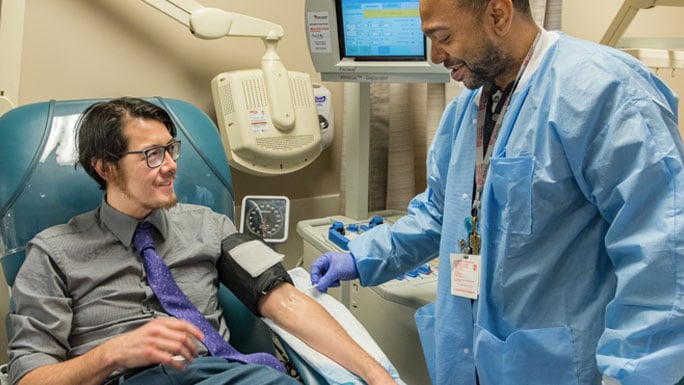Blood Donation FAQs
Frequently Asked Questions About Giving Blood

Help our patients in their recovery by donating the blood and platelets they need.
The vast majority of people feel fine after giving blood, however it is always important to eat a healthy, well-balanced meal before donating and to be well-hydrated. This allows your body to recover as quickly as possible after donation, as well as provide the best possible blood product for our patients.
Eating an iron-rich diet, especially in the days preceding your donation, is an important way to help your body recover after blood donation.
Whole blood can be donated every 56 days. Platelets can be donated every seven days, up to 24 times a year. The usual interval for blood donation is every eight weeks.
What to Know About Donating Blood
The Food and Drug Administration (FDA) has specific criteria for blood donation eligibility. In general you must:
- Be at least 17 years of age
- Be in good health and feel well
- Be well-hydrated and had a recent meal or snack
- Weigh at least 110 pounds
Your body needs iron to make new RBCs and to perform other metabolic tasks. Iron comes from either pre-existing iron stores in your body or iron in the food you eat. Many menstruating women may not have enough iron stored in their body to make RBCs to replace their donation. Men have more iron stores; however, with frequent donation, iron stores in men can also become depleted.
Low iron stores are common, particularly in women of childbearing age.
Eating a well-balanced, iron-rich diet is helpful. The recommended daily allowance (RDA) for iron varies by gender, but is at least 8 mg for all adults.
Foods High in Iron:
- Beans
- Broccoli
- Brussels Sprouts
- Dried Fruits
- Leafy Green Vegetables
- Molasses
- Nuts
- Peas
- Prunes and Prune Juice
- Poultry
- Red Meat
- Shellfish & Fish
- Strawberries
- Sweet Potatoes
- Tomatoes and Tomato Juice
What about iron supplements?
If diet alone does not replace all the iron lost from blood donation, taking iron supplements may help.
There are many different types of iron supplements. The University of Chicago Medicine Blood Donor Services does not provide prescriptions for over-the-counter iron products. Please ask your doctor if you have any questions about your underlying health conditions and starting iron supplements. Your doctor or pharmacist may be able to assist you in deciding what dose, type and duration of iron supplement to choose. Donors who take one multivitamin with iron (typically 18 mg elemental iron) each day for three months, or one iron caplet (commonly 325 mg tablets of ferrous sulfate, which provide about 65 mg of elemental iron) each day for about two months, can replace the amount of iron lost in one unit of donated RBCs.
Do not take more than the recommended dosage of iron because higher doses can be harmful. Iron-containing supplements should be properly stored to prevent accidental ingestion by babies and children. If your child swallows an iron pill, contact a poison control center right away.
More information
Iron: Fact Sheet for Consumers (National Institutes of Health)
Please eat a snack, drink something and remain in the post-donation area for at least 15 minutes after donating blood.
You may resume your normal activities following an adequate rest period of 30 minutes. However, do not engage in heavy lifting, strenuous work or excessive exercise or for 24 hours.
Drink extra fluids (non-alcoholic beverages) for the 24 hours post-donation.
It is best to refrain from smoking for at least three hours post donation.
Leave the pressure bandage on for several hours after your donation.
If you feel faint or dizzy after leaving the Blood Donation Center, sit down immediately. If such a feeling continues, call the Blood Donation Center at 773-702‐6247 or your physician.
The skin around the needle puncture may become bruised/discolored. This is normal. If the puncture site becomes swollen, more tender, or bleeds without stopping after applying firm pressure for five minutes, call the Blood Donation Center at 773-702‐6247 or your physician.
Contact the Blood Donation Center 773-702-6247 if any illness develops within the next few days or if you feel your blood donation may not be suitable for transfusion to others.
Make a Blood Donation Appointment
Call 773-702-6247 or complete our online form to schedule a blood donation appointment (whole blood donation or platelets).Hours
Monday through Friday8 a.m. to 3 p.m.
Location
Duchossois Center for Advanced Medicine5758 S. Maryland Avenue, Room 2E
Chicago, IL 60637
